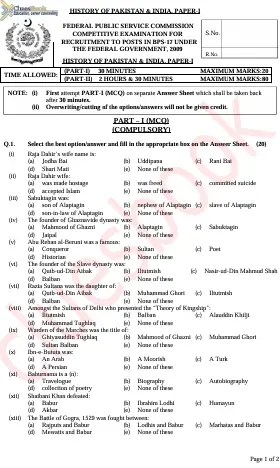Download the History of Pakistan and India Past Papers CSS 2009 PDF. Explore exam insights, timeline of key themes, recommended references, and preparation strategies.

History of Pakistan and India Past Papers CSS 2009 Overview
The 2009 History of Pakistan and India past paper carried a classical orientation. Unlike later years that demanded heavy analysis, this exam revolved around historical narratives, chronological understanding, and reform movements. Students with command on facts and the ability to present them in sequence had an advantage.
Structure and Nature of Questions
In 2009, the examiner’s approach was to test:
- Grasp of Mughal decline and its consequences.
- Understanding of British expansion and colonial structures.
- Familiarity with reformist movements among Muslims and Hindus.
- Awareness of Pakistan Movement milestones.
This paper leaned toward factual yet descriptive answers, though analytical touches improved scoring.
About the CSS
The CSS (Central Superior Services) Competitive Examination is a rigorous federal-level test administered by the Federal Public Service Commission (FPSC) to select candidates for prestigious civil service roles across Pakistan. The exam’s rules and regulations, covering age limits, eligibility, subjects, and quotas, are detailed in the official CSS Rules section on the FPSC’s website.
The CSS Exam Rules, issued by FPSC Pakistan, outline eligibility criteria, age limits (21–30 years), and a maximum of three attempts for candidates. The exam includes written tests, a medical exam, a psychological assessment, and an interview. Rules also define quotas, disqualification grounds, and subject selection for a fair recruitment process.
Timeline of Key Themes
| Historical Period | Focus in 2009 Paper |
| 1700s – Decline of Mughals | Loss of central authority, regional states emerging. |
| 1800s – British Rule | Conquest, administrative policies, economic and social changes. |
| Late 1800s – Reform | Sir Syed Ahmad Khan, Aligarh Movement, Hindu revival movements. |
| Early 1900s – Nationalism | Muslim League, Hindu-Muslim differences, political developments. |
| 1940s – Creation of Pakistan | Lahore Resolution, leadership of Quaid-e-Azam, independence in 1947. |
This timeline captures the examiner’s historical flow, making it easier for aspirants to prioritize topics.
Distinctive Importance of 2009 Paper
The 2009 exam is considered valuable because:
- It provided a foundation for later analytical-style papers.
- It emphasized reformist leaders in detail.
- It set a trend of blending political and cultural aspects.
- It rewarded students who memorized chronological details.
CSS Past Papers History of Pakistan and India 2009- Study Sources
To prepare similar questions, students should use:
- The Cambridge History of India (relevant volumes)
- A Short History of Pakistan edited by I.H. Qureshi
- Muslim Struggle for Pakistan by Ishtiaq Hussain Qureshi
- Past papers (2000–2015) for recurring topics
PDF Download
You can download the original CSS History of Pakistan and India 2009 past paper (PDF) from the link below. It is unsolved and formatted for practice. The examiner in 2009 appeared to check historical continuity, political awareness, and role of reformists rather than heavy critical analysis.
This shows the gradual evolution of CSS History paper patterns in later years.

